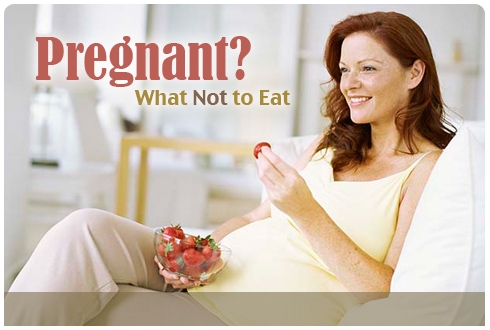More foods can affect your health or your baby's than you might realize. Find out what foods to avoid during pregnancy.


You want what's best for your baby. That's why you add sliced fruit to your fortified breakfast cereal, top your salads with chickpeas and snack on almonds. But do you know what foods to avoid during pregnancy? Start with the basics in pregnancy nutrition. Understanding what foods to avoid during pregnancy can help you make the healthiest choices for you and your baby.

Avoid seafood high in mercury
Seafood can be a great source of protein, and the omega-3 fatty acids in many fish can promote your baby's brain and eye development. However, some fish and shellfish contain potentially dangerous levels of mercury. Too much mercury could harm your baby's developing nervous system.
The bigger and older the fish, the more mercury it's likely to contain. The Food and Drug Administration (FDA) and the Environmental Protection Agency (EPA) encourage pregnant women to avoid:
- Swordfish
- Shark
- King mackerel
- Tilefish
So what's safe? Some types of seafood contain little mercury. Although concerns have been raised about the level of mercury in any type of canned tuna, the FDA and EPA say pregnant women can safely eat up to 12 ounces (340 grams) a week. Similarly, the 2010 Dietary Guidelines for Americans recommend 8 to 12 ounces — two average meals — of seafood a week for pregnant women. Consider:
- Shrimp
- Canned light tuna (limit albacore tuna and tuna steaks to no more than 6 ounces, or 170 grams, a week)
- Salmon
- Pollock
- Catfish
- Anchovies
- Trout
Not all researchers agree with these limits, however, citing a study that noted no negative effects for women who ate more seafood than the FDA-approved guidelines.

Avoid raw, undercooked or contaminated seafood
To avoid harmful bacteria or viruses in seafood:
- Avoid raw fish and shellfish. Examples include sushi, sashimi, and raw oysters, scallops or clams.
- Avoid refrigerated, uncooked seafood. Examples include seafood labeled nova style, lox, kippered, smoked or jerky. It's OK to eat smoked seafood if it's an ingredient in a casserole or other cooked dish. Canned and shelf-stable versions also are safe.
- Understand local fish advisories. If you eat fish from local waters, pay attention to local fish advisories — especially if water pollution is a concern. If advice isn't available, limit the amount of fish from local waters you eat to 6 ounces (170 grams) a week and don't eat other fish that week.
- Cook seafood properly. Cook fish to an internal temperature of 145 F (63 C). Fish is done when it separates into flakes and appears opaque throughout. Cook shrimp, lobster and scallops until they're milky white. Cook clams, mussels and oysters until their shells open. Discard any that don't open.
Avoid undercooked meat, poultry and eggs
During pregnancy, you're at increased risk of bacterial food poisoning. Your reaction might be more severe than if you weren't pregnant. Rarely, food poisoning affects the baby, too.
To prevent foodborne illness:
- Fully cook all meats and poultry before eating. Use a meat thermometer to make sure.
- Cook hot dogs and luncheon meats until they're steaming hot — or avoid them completely. They can be sources of a rare but potentially serious foodborne illness known as listeriosis.
- Avoid refrigerated pates and meat spreads. Canned and shelf-stable versions, however, are OK.
- Cook eggs until the egg yolks and whites are firm. Raw eggs can be contaminated with harmful bacteria. Avoid foods made with raw or partially cooked eggs, such as eggnog, raw batter, and freshly made or homemade hollandaise sauce and Caesar salad dressing.
Avoid unpasteurized foods
Many low-fat dairy products — such as skim milk, mozzarella cheese and cottage cheese — can be a healthy part of your diet. Anything containing unpasteurized milk, however, is a no-no. These products could lead to foodborne illness. Avoid soft cheeses, such as Brie, feta and blue cheese, unless they are clearly labeled as being pasteurized or made with pasteurized milk. Also, avoid drinking unpasteurized juice.
http://www.mayoclinic.org/healthy-living/pregnancy-week-by-week/in-depth/pregnancy-nutrition/art-20043844


No comments:
Post a Comment